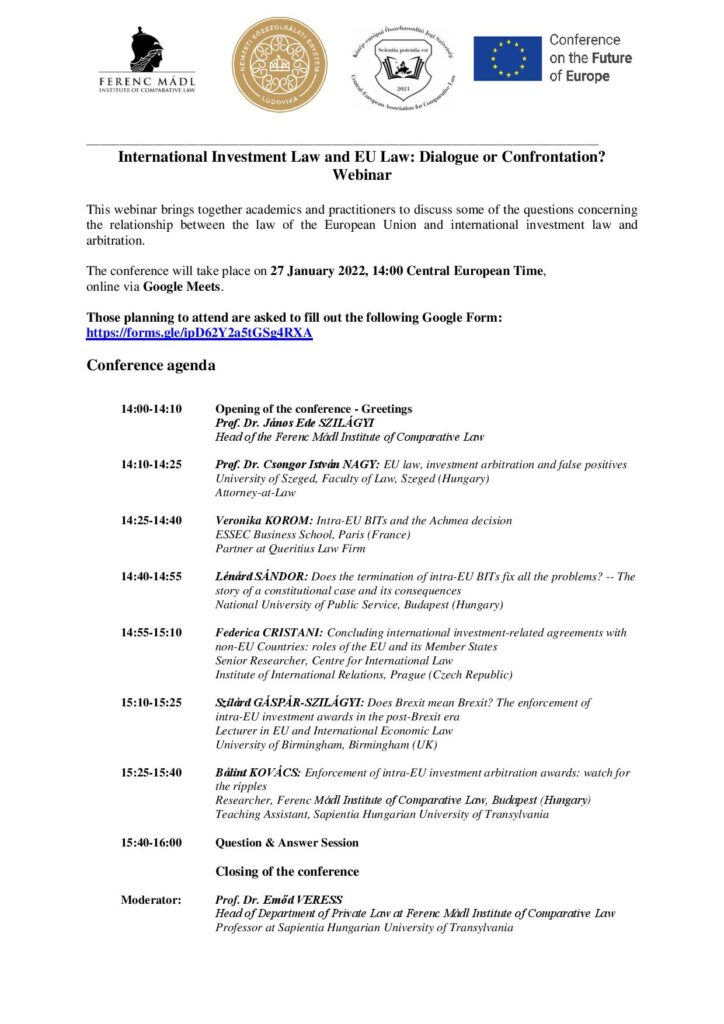On 27 January 2022 the Ferenc Mádl Institute of Comparative Law, the Eötvös József Research Centre (National University of Public Service, Budapest, Hungary) and the Central European Association for Comparative Law organized a webinar under the guise of the EU program Conference on the Future of Europe , titled “International Investment Law and EU Law: Dialogue or Confrontation?”.
The webinar brought together academics and practitioners to discuss some of the questions concerning the relationship between the law of the European Union and international investment law and arbitration. Some of the presenters will have the results of their research published in the first volume of 2022 of the Central European Journal of Comparative Law, available here.
The conference was opened by Prof. János Ede Szilágyi, Head of the Ferenc Mádl Institute of Comparative Law, who greeted our guests and the speakers. The academic program of the conference was moderated by Prof. Emőd Veress, Head of the Department of Private Law at the Ferenc Mádl Institute of Comparative law.
We kicked off the webinar with the presentation of Professor Csongor István Nagy (University of Szeged, Hungary/Attorney-at-Law) titled „EU Law, Investment Arbitration, False Positives”, in which he addressed EU law’s relation to investment arbitration, in particular in intra-EU matters. Professor Nagy presented the “sudden death” of intra-EU investor-state dispute settlement, triggered by the CJEU’s ruling in Achmea and followed by the judgments in Poland v PL Holdings Sarl, Republic of Moldova v Komstroy and European Food (Micula), a set of declarations by the Member States and the 2020 Termination Agreement. The presentation analyzed the abolition of intra-EU BITs from three angles: conceptual issues, policy issues and global issues. It demonstrates that the ruling of the Court of Justice of the European Union (CJEU) in Achmea may be more convincingly reconstructed by means of policy considerations than by means of the conceptual arguments offered by the CJEU, which is at crucial points contradictory. The presentation showcased the policy considerations that apparently determined the outcome of the case and the global issues that arise when the EU attempts to block a global system unilaterally. The presentation’s central argument was that the Achmea ruling is a false positive: it suppresses a mechanism that fostered the European integration instead of stalling it.
Our next presenter was Dr. Veronika Korom (Assistant Professor at ESSEC Business School in Paris / Attorney-at-Law, Partner at Queritius) with the title „Intra-EU BITs and the Achmea decision”. Dr. Korom set the stage with observations regarding the Achmea decision and its consequences. In its Achmea decision rendered in March 2018, the CJEU declared that arbitration clauses contained in intra-EU bilateral investment treaties are incompatible with EU law. The Court’s judgment brought to an end the decade long legal battle between the Member States and the European Commission over the EU law compatibility of these treaties. In response to Achmea, the majority of Member States have agreed to terminate their treaties in order to eliminate the EU law incompatibility identified by the Court. At the same time, the political battle over the need for the special protection of cross-border investments in the EU continues. The presentation briefly looked back at the political and legal controversy that was sparked by intra-EU bilateral investment treaties and which culminated in the Court’s Achmea judgment, and also addressed some of the practical consequences of Achmea for intra-EU investment protection.
The presentation of Dr. Lénárd Sándor (International Law Center, Mathias Corvinus Collegium, Budapest, Hungary) was titled „Does the termination of intra-EU BITs fix all the problems? – The story of a constitutional case and its consequences”. In this presentation Dr. Sándor looked into a specific constitutional dilemma and aimed to explore whether the agreement for the termination of intra-EU bilateral investment treaties did in fact fix all the dilemmas these treaties had raised. The starting point of the presentation was that one might face a “trialogue” instead of a “dialogue”, since the interactions expand beyond EU law and international investment law and they might also include constitutional questions. It first highlighted the main mechanisms as well as the major aspiration of the termination agreement that Member States concluded in light of the Achmea judgment. Instead of opening new channels of judicial dialogues, the ultimate goal of the agreement is to discontinue all pending intra-EU investment arbitration procedures. The presentation showed what alternative avenues the termination agreement is offering. However, this regulatory approach put the investors in a fork-in-a-road-situation which might weaken their positions. The presentation explored this dilemma through a concrete pending case before the Constitutional Court of Hungary. In connection with this constitutional dilemma, the presentation shed light on three lines of legal thought: the international legal aspect of the case, to what extent the European judicial dialogue and the CJEU shall be involved and the constitutional balancing exercise the principle of non-retroactivity requires in the case-law of the Constitutional Court. Finally, the presentation drew some lessons learned as the termination agreement does not seem to “kill every bird with one stone.”
The following presentation was that of Dr. Federica Cristani (Senior Researcher, Institute of International Relations, Prague, Czech Republic), titled „Concluding international investment-related agreements with non-EU Countries: roles of the EU and its Member States”. The 2009 Lisbon Treaty added an important exclusive competence for the European Union (EU) in the common commercial policy area, namely, foreign direct investment, which made it a crucial actor in international investment protection. This has a huge impact on shaping international investment policy in Europe and has raised important questions, especially regarding the legal consequences of the EU’s exclusive competence in the negotiation process of international investment agreements (IIAs) with third countries. This presentation explores the role of the EU and its member states in negotiating and concluding IIAs with third countries. Firstly, the presentation illustrated when individual member states are authorized to conclude a new bilateral investment treaty with a third country, with a focus on the EU´s Regulation No 1219/2012 and its implementation. Secondly, the presentation questioned what it meant for the EU and its member states to conclude investment mixed agreements with third countries, how the negotiation processes are to be conducted, and what was the impact of the division of competences between the EU and its member states. Finally, the presentation showed the current issues of ius standi and financial responsibility in investment dispute settlement involving foreign investors, with a focus on the EU´s Regulation No 912/2014 and the negotiation processes of the EU with third countries.
In his presentation „Does Brexit mean Brexit? The enforcement of intra-EU investment awards in the post-Brexit era” Dr. Szilárd Gáspár-Szilágyi (Lecturer at University of Birmingham, UK) presented the results of an analytical research in order to dissect the major legal issues concerning the enforcement of intra-EU awards post-Brexit. The outcomes of the enforcement cases will depend on the country where enforcement is sought (EU Member States, the UK, and other third countries), the applicable legal regime pursuant to which enforcement is sought (the New York Convention or the ICSID Convention), various temporal factors (whether certain key moments in the arbitral proceedings occurred before or after the end of the Brexit transition period), and whether the intra-EU cases are based on intra-EU BITs or the ECT, or both. According to Dr. Gáspár-Szilágyi, due to this complexity, there is no easy answer as to how the various issues arising from the post-Brexit enforcement of intra-EU awards should be solved. Our speaker concluded that this is most unfortunate as it creates uncertainty for investors, host States, and national courts of enforcement alike.
The conference was closed by Bálint Kovács (Researcher at Ferenc Mádl Institute of Comparative Law, Budapest, Hungary) with the presentation titled „Enforcement of intra-EU investment arbitration awards: watch for the ripples”. According to Bálint Kovács the attempts of the European Commission at ending intra-EU investment arbitration, as well as the decisively helping hand lent by the CJEU have produced massive splashes, rightfully attracting much attention. However, the ripples after the several splashes have had limited effects. The presentation addressed how this has actually affected recognition and enforcement within and outside the EU. Although the judgments of the CJEU have had limited effects outside the EU, they have definitely made it more difficult to enforce intra-EU awards within the EU. However, Kovács noted, due to the fact that States have now been given a seemingly legitimate reason to refuse the execution of awards, facing the might of a State refusing to voluntarily execute an award in good faith has put investors in quite a difficult position. Despite recognition and enforcement being hailed as the crown jewels of investment arbitration, these have been among the first to feel the ripples of the mentioned splashes.


